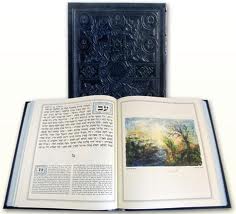Rabbi Chanan Morisson ( based on the writings of Harav Kook)
 Are our powers of logic and reason sufficient in order to know how to live a life of morality and holiness?
Are our powers of logic and reason sufficient in order to know how to live a life of morality and holiness?
Solomon’s Problem
Solomon had finished building the Temple in Jerusalem, but there was an unforeseen complication. Everything was done; the entire structure and all of its vessels were complete. All that remained was the final act of placing the ancient Ark – containing the luchot from Mount Sinai – into the Holy of Holies.
It should have been simple. Except that the Temple gates were closed shut and refused to open.
Solomon pleaded to God with twenty-four supplications, and the Temple gates finally opened. From this incident the Sages learned that in times of great need – when a special fast day is declared due to drought – our prayers should contain not eighteen but twenty-four berachot (blessings), like Solomon’s prayer.
What is the significance of the number twenty-four? And why was placing the Ark inside the Holy of Holies such an important event?
Twenty-Four Blessings
The Temple and the Ark represent two major themes in Judaism. The holy Temple is the focus of Israel’s avodah, service of God. The Ark, on the other hand, containing the stone tablets inscribed with the Ten Commandments, represents Torah and its revelation to the people of Israel.
The final act of building the Temple was placing the Ark inside the Holy of Holies. This was a highly significant act, for it combined together these two primary values – Torah and Divine service. More to the point: it teaches that without the Ark, the Temple is incomplete.
This principle is not just about the Temple service. It is a fundamental lesson about all forms of avodat Hashem. Without Torah, without being informed by Divine revelation, it is impossible to know the proper way to serve God. We cannot truly fulfill our moral obligations, nor can we realize our spiritual aspirations, only on the basis of our intellect and logic. Why is this?
It may be possible to deduce major moral principles using our powers of reason. But without Torah, it is impossible to know how to serve God and follow an ethical path in all of life’s myriad circumstances and situations.
This is the significance of the number twenty-four. There are twenty-four hours in the day, so twenty-four represents the various situations that we find ourselves in – waking up, at work, at home, and so on. Each hour finds us in a different situation, requiring its own special rules of conduct. These varied circumstances underline the need for detailed Divine instruction – i.e., Torah.
Thus, when placing the Torah ark inside the Temple, King Solomon prayed with twenty-four supplications. He understood that without the Torah’s guidance in all aspects of life, it is impossible to attain true service of God.
Appropriate Piety
If so, perhaps this type of prayer, a prayer with twenty-four blessings, is relevant for all days of the year. Why only on fast days?
A fast day is a time dedicated to teshuvah and the refinement of character traits and deeds. At such times it is especially important that our spiritual growth is based on the counsel of Torah, and not solely on our own intellect. On a fast day one may be inclined to accept new obligations – obligations that are not in accord with the Torah’s teachings. Extra piety is not always a good thing; it may also lead to undesirable results. A stringency in one area may lead to a leniency in another. For this reason there is an ancient custom to read from the Torah on fast days, indicating that our spiritual efforts should be enlightened by Torah.
‘His Feet Will Not Stumble’
This is what the psalmist taught,
“The Torah of His God is in his heart; his feet will not stumble.” (Ps. 37:31)
The two parts of the verse, Rav Kook explained, are cause and effect. It is because the “Torah is in his heart” – because one bases one’s life and moral decisions on the Torah’s teachings – that “his feet will not stumble.” One who is firmly entrenched in Torah will avoid the spiritual errors of those who rely solely on their intellect and powers of reasoning.
(Adapted from Ein Eyah vol. I on Berachot 29, IV:45)
Our prayers are with you, that Hashem will supply the strength, fortitude and wisdom for all Israel.
He, who has created the smith to fashion and form the strength of His people, has also given you the promise that no weapon formed against you shall prosper. This is your magnificent heritage.
How helpful your words are to understand the heart of the current season and how our intercessions for you might be directed.
We so appreciate you sharing with us this blog! Thank you Moshe!
From a family in Canada who think of you often and lift you up in our prayers to Hashem.